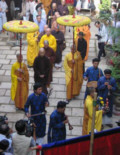
“I am surprised by the singularly “un-Buddhist” behaviour of Thich Nhat Hanh”, said IBIB Director and UBCV International spokesman Vo Van Ai. “His sudden and adamant insistence on meeting Thich Quang Do, and the pushy methods used by his followers to obtain this meeting are very curious, especially since, according to the agenda he circulated in Vietnam, this visit was not planned. It is understandable that Thich Quang Do refuses to receive Thich Nhat Hanh if he is flanked by an escort of officials from the Government Religious Board and the State-sponsored Vietnam Buddhist Church”.
Upon their arrival in Ho Chi Minh City (former Saigon) on Sunday 23 January, Thich Nhat Hanh immediately sent his assistant Sister Chan Khong to the Thanh Minh Zen Monastery, where Thich Quang Do is currently under house arrest. Accompanied by 12 monks from the Plum Village delegation and several monks from Ho Chi Minh City’s State-sponsored VBC, Sister Chan Khong asked Venerable Thich Thanh Minh, the Monastery’s Superior monk to call Thich Quang Do on the interphone. Before he could speak, she seized the phone and asked Thich Quang Do if he would arrange an appointment with Thich Nhat Hanh.
Thich Quang Do declined her demand, saying that he was under house arrest, and did not have Police authorization. Sister Chan Khong insisted that she had already obtained the Security Police’s consent. Thich Quang Do replied that she and her delegation may be entitled to Police permission, but he did not enjoy the same rights. Sister Chan Khong stayed outside the Monastery for an hour discussing what to do with the State-sponsored VBC monks before finally leaving.
On Monday 24 January, Thich Nhat Hanh went to the Gia Lam Pagoda, where he had a scheduled meeting with Very Venerable Thich Tri Quang, the former well-known leader of the 1960s Buddhist protest movements (homonym of Thich Tri Quang, head of the State-sponsored VBC in Ho Chi Minh City). This visit also caused a considerable stir. Thich Nhat Hanh wanted to make a ceremonial entrance to the Pagoda, and asked the monks in Gia Lam to beat the Dharma drum as he walked in procession from the street, shaded by silk parasols and flanked by Religious Board officials and VBC monks.
The monks at Gia Lam Pagoda refused to beat the Dharma drum, which is only used for solemn occasions, stating that it was inappropriate for Thich Nhat Hanh, a former pupil of Thich Tri Quang, to visit his old master with such extravagance. When he insisted, the monks finally agreed to let him enter in procession with the monks and government officials, on condition that Venerable Thich Quang Do would be granted the same honours if he came to visit. The Religious Board officials refused, and Thich Nhat Hanh was obliged to enter the pagoda without ceremony.
Inside Gia Lam, instead of first paying his respects at the Buddha altar in keeping with Buddhist traditions before meeting Thich Tri Quang, Thich Nhat Hanh went straight to the room of Thich Tue Sy, one of the four newly-appointed UBCV Vice-Presidents. The door was locked, and Thich Tue Sy’s assistant Thich Nguyen Vuong said that his Master was in retreat. A member of Thich Nhat Hanh’s delegation told him to hand over the keys so they could go in and meet Thich Tue Sy, but Thich Nguyen Vuong refused, adding that in any case, only his Master kept the keys.
Thich Nhat Hanh then met with Thich Tri Quang for a discussion of over 40 minutes, accompanied by Thich Giac Toan, an official from the State-sponsored VBC. The contents of their talks were not revealed.
These recent incidents take place only a few days after one of the other four UBCV Vice-Presidents, Thich Vien Dinh sent a letter to Thich Nhat Hanh (19.1.2005) reproaching the exiled monk for playing into the hands of Vietnam’s repressive religious policies and implicitly endorsing the integration of the UBCV within the State-sponsored VBC.
 Quê Me Quê Me: Action for democracy in Vietnam & Vietnam Committee on Human Rights
Quê Me Quê Me: Action for democracy in Vietnam & Vietnam Committee on Human Rights



